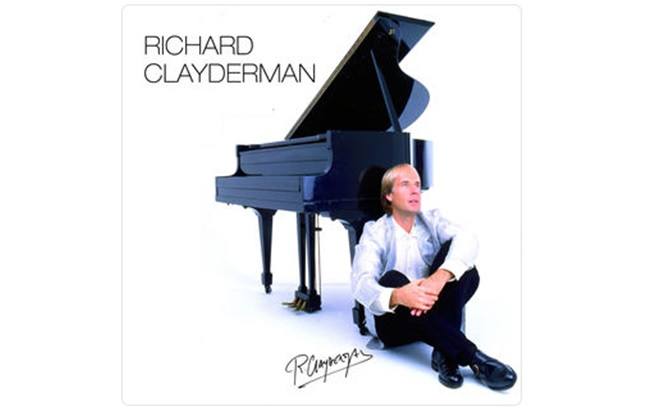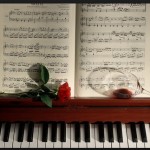
The Guinness Book of World Records says Richard Clayderman (born Philippe Pagès) is the most successful pianist in the world. He is known the world over for his soothing, lush and sophisticated piano music.
About Richard Clayderman
If you’re a beginner on the piano, and haven’t heard of Richard Clayderman (very unlikely though), I would suggest that you pick up one of his CDs right away and start listening to it.
Richard Clayderman (born Philippe Pagès) started learning classical piano under the tutelage of his father, he then enrolled in the Paris Conservatory of Music at the age of 12.
Despite his classical background, Clayderman opted for popular music when he launched his professional career. A tour as opening act for French rock musician Johnny Hallyday introduced him to an international following. Clayderman’s debut album, Ballade Pour Adeline, recorded at the urging of producers and composers Oliver Toussaint and Paul de Senneville in 1977, sold more than 20 million copies and was distributed in 38 countries.
Clayderman, who took his stage name from his Swedish grandmother, has continued to tour throughout the world to enthusiastic audiences. A live concert broadcast on Chinese television in 1987 attracted more than 800 million viewers.
Website: http://www.clayderman.co.uk
Listen to Richard Clayderman
Richard Clayderman Interview
For the first time in years Richard Clayderman is headed to Australia. The 63-year-old international best selling recording artist and concert performer talks to Starts at 60 ahead of his tour that starts at the end of this month. Here’s what the French pianist had to say:
SAS: You’ve spoken before about having health issues when you were younger, such as surgery for an ulcer when you were 17, which you attributed to a bad diet. How is your health now, and what changes have you made in your life to keep up the pace of touring and performing?
RC: It’s true that I had an ulcer. I think it was most likely due to a bad diet. I wasn’t really eating the best food at that time, and maybe that explains the surgery. Since then, I’ve been lucky. I don’t drink alcohol, I don’t smoke, and I try to avoid eating too much. I do my best to keep fit. I used to do some sports like tennis and jogging but my doctor since told me to stop jogging as it’s bad for the knees. I don’t play tennis anymore but I have a fitness instructor who visits my home to teach me exercises that I can to do to be in the best physical condition.
SAS: What else do you do to prepare – physically, mentally and emotionally – for an arduous concert tour that can take you away from your routine for long periods?
RC: When I’m on tour, I try to go to the hotel gym to exercise and I find massage helpful to relax the muscles as well as my mind.
SAS: Do you bring any creature comforts with you when you’re away from home?
RC: My essential creature comfort is a keyboard. In fact, as I cannot fly with my acoustic piano, it is essential for me to be provided with a digital piano. Nowadays, there are very high quality digital pianos with heavy keyboards which allow me to practice my piano late at night or very early morning when I’m in a hotel without disturbing the neighbours. Such digital pianos are a real addiction for me. If I don’t have this piano in my hotel room, I don’t feel comfortable. I get a little nervous. Apart from this, in the morning, I like to have freshly squeezed orange juice, and although I prefer to drink Evian water, I must say there are very good mineral waters in the different countries around the world and I am very happy with this mineral water.
SAS: Do you still enjoy performing live or do you prefer record albums in a studio, and why? What do you like to perform the most?
RC: “When I do my studio recordings, I like to make sure that I have all the time necessary before the recording so that I can practice the pieces that I will record and not be reliant on the score. I suppose I need a certain freedom to express my emotions through my fingers. It’s the same when I play live on stage, but when I’m on stage, I can’t play a piece again like I can in a recording session. I get one shot at that on stage. Still, I prefer to play live on stage because it’s not so cold and distant. I play for people in front of me. For my audience. When I play in a studio, I play for future listeners, but the studio lacks the warmth and closeness of the audience.
SAS: Can you tell us about your start in the industry? We understand that you started working after your father became ill to earn some money. What was that like for you? What keeps you creating and touring now?
RC: Well, my father has been both very inspiring and very essential as he gave me the opportunity to enter the world of piano. Sadly, he became ill quite suddenly, and in the end, he passed away. So, I had to earn my living, and that’s how I became a piano accompanist in some music groups. Then, I was spotted by some people and I become an accompanist to some stars. That’s how I got into show business as a piano accompanist, and that is also how I was noticed by two record producers who asked me take part in a piano competition, and I was the winner of this competition, so I was offered the opportunity to record Ballade pour Adeline.
SAS: You mention on your website that you never wanted to become a star, but now you are a superstar. How did you cope with the fame? Did your parents or family give you advice that’s stuck with you as an adult? What keeps you grounded?
RC: In fact, I know some singers and actors who, at 16 or 17 years old, wanted to become well-known. However, I wasn’t at all concerned by the idea of one day becoming someone notorious. My wishes were to be a piano accompanist, and that’s all. Nobody could imagine that I would become well-known in so many countries around the world. It was quite a surprise. I remember when I was unknown in France and very well-known in Spain. I was not known in Paris, and when I landed at Madrid airport, there were a hundred young girls waiting for me. This was in 1978. I was a bit embarrassed and shy, and was not feeling so comfortable. Still today, I suppose I’m not so comfortable being known or recognised.
SAS: What other passions do you have outside of music?
RC: In fact, my only real passion is music, but I was also fond of tennis and jogging for quite some time. I’m not young enough to practice these sports but I love to read books, particularly biographies of actors, singers, and instrumentalists. I’m also quite passionate about jazz music like Chick Corea and Pat Metheny.
SAS: Following this Australian tour, what’s next for Richard Clayderman?
RC: After my concert in Australia, I plan to perform in China. Then in August, I will perform in Spain and Latin America. Ireland and Moscow in September, then Canada and the United States. Early November, I’m planning a few shows in Israel before starting a series of 10 shows in Germany. I’m lucky to be offered the opportunity to perform in many different countries around the world, and this is so rare for an instrumentalist. I think that I am a lucky piano player.
Source: startsat60
Buying Links
- [easyazon_link keywords=”Richard Clayderman” locale=”US” tag=”keytarhq04-20″]Richard Clayderman on Amazon[/easyazon_link] | Richard Clayderman on Walmart.com
 | Richard Clayderman on itunes | Richard Clayderman on Target.com
| Richard Clayderman on itunes | Richard Clayderman on Target.com
Have anything to share on Richard Clayderman? Please share it below.
KeytarHQ editorial team includes musicians who write and review products for pianists, keyboardists, guitarists & other musicians. KeytarHQ is the best online resource for information on keyboards, pianos, synths, keytars, guitars and music gear for musicians of all abilities, ages and interests.



Leave a Reply